Hot!
Asanteman marks Silver Jubilee of Otumfuo Osei Tutu II
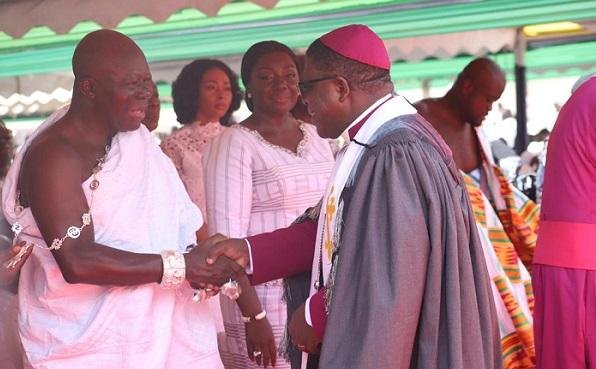
Most Reverend Dr. Paul Kwabena Boafo, the Presiding Bishop of the Methodist Church, Ghana greets the Asantehene
The 25th anniversary of the ascension of Otumfuo Osei Tutu II, to the Golden Stool as the Asantehene, has taken off smoothly with a plethora of events.
It started with the successful commemoration of the 150th Sagrenti war with a durbar of chiefs who witnessed the presentation of regalia to the Asantehene by the University of California, of the first batch of seven objects looted in the third Anglo-Asante War of 1874.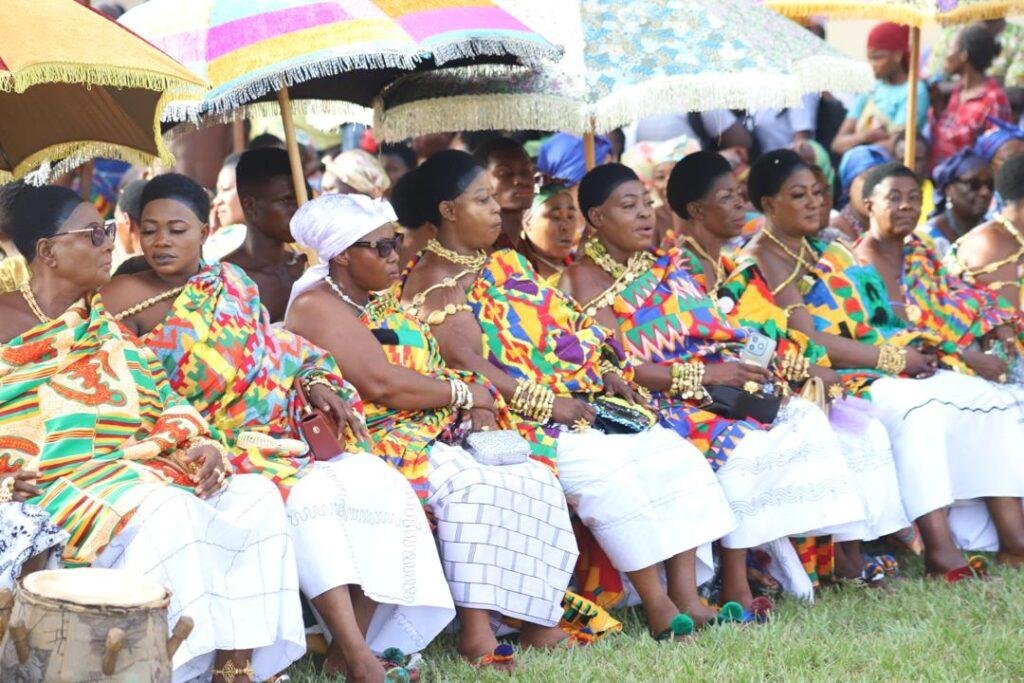
It was dubbed the ‘Kuntunkuni’ durbar, as all and sundry wore black, to mark the commemoration of the 150 years of the Sagrenti War.
The seven returning objects go back to the period before Asantehene Kofi Karkari in the 1840s and include an ornamental chair of wood, brass, leather and iron, 10 large beads worn as bracelet or anklet; strand of seed or bug-shaped beads; gold of an elephant hair, glass and silver; a royal stool ornament; a royal necklace and a royal stool ornament.
At the Dwaberem of Manhyia Palace, the atmosphere was charged with the beating of Fontomfrom and other cultural drums and displays and the arrivals of Paramount Chiefs carried in palanquins.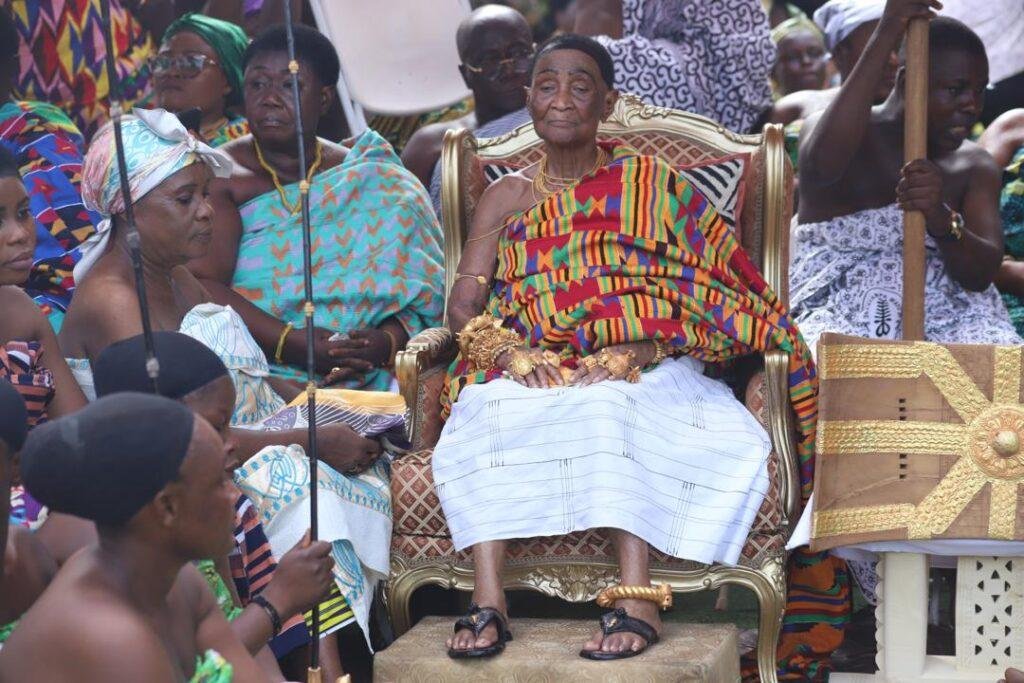
Again, there has been the commissioning of a multi-purpose auditorium constructed by the King at the Manhyia Palace in March.
A non-denominational thanksgiving service was also held to celebrate the anniversary at Dwabrem where the Otumfuo praised religious bodies stressing that their spiritual guidance has been the source of his successful 25-year reign on the Golden Stool.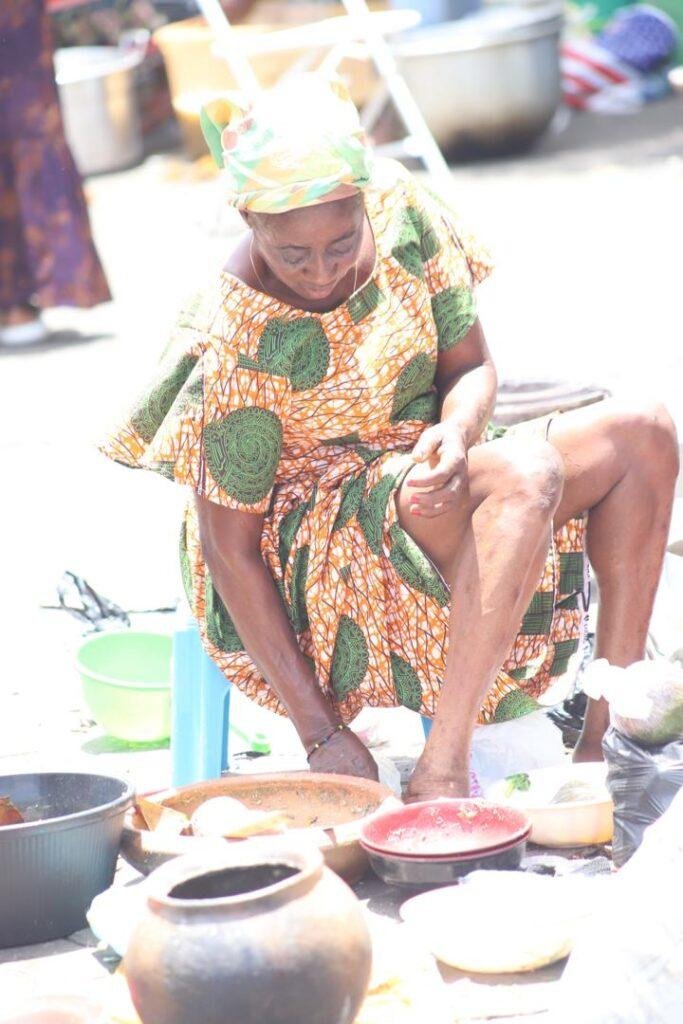
A commemorative postage stamp of the Asantehene was also unveiled by Ghana Post at a ceremony attended by the Minister of Communication and Digitalisation, Ursula Owusu-Ekuful.
The Mamponghene, Dasebre Osei Bonsu, thanked Ghana Post for the honour and announced that the Manhyia Palace Museum, under the auspices of the Asantehene, Otumfuo Osei Tutu II, has also been re-opened to the public.
Also on display are seven sections of sheet-gold ornament, one silver spoon, one pair of silver anklets and one section of sheet-gold ornament.
Speaking at the homecoming of the looted artefacts, Otumfuo Osei Tutu indicated that the return of the items was a restoration of the Asante spirit.
“The items that came back are virtually the soul of the people of Asante. Not all of them have returned.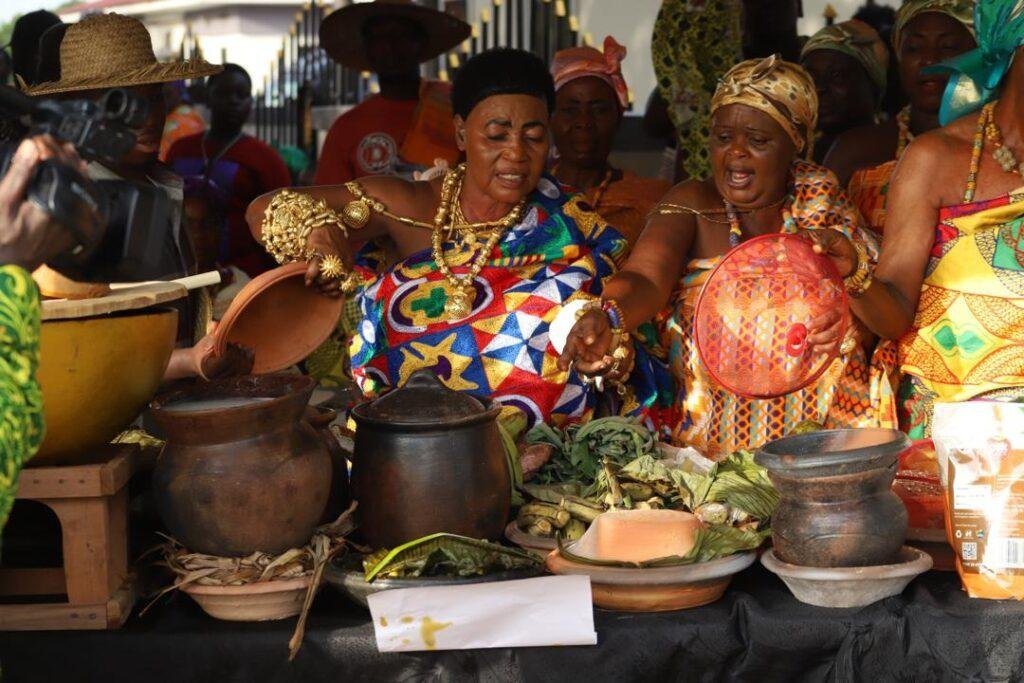
But, what we have here embodies the soul of Asante. Today is a day for Asantes and for the Black African continent. The spirit that we bore and share is back with us,” he said.
The celebration also witnessed a grand event of Asanteman queen mother’s day that highlighted the rich culinary heritage of the Asante Kingdom.
The event, graced by esteemed guests including the Asantehene, the Asantehemaa, Nana Konadu Yiadom III, Chief of Staff of the Office of the President, Frema Osei Opare, among others, witnessed a blend of tradition, culture, and gastronomy.
On April 26, 1999, the Asantehene was enstooled as the 16th occupant of the Golden Stool.
The event would be climaxed tomorrow with a grand durbar of chiefs and people at the Dwabrem of the Manhyia Palace.
From Kingsley E. Hope, Kumasi
• Most Reverend Dr. Paul Kwabena Boafo, the Presiding Bishop of the Methodist Church, Ghana greets the Asantehene.
Hot!
Education free, but parents have roles to play – Anloga DCE

Madam Sandra Seyram Kpedor, the District Chief Executive (DCE) of Anloga in the Volta Region, has emphasised the importance of parental involvement in children’s education, stating that education is free, but parents need to do more to support their children.
She said parents, teachers, and students must be involved in addressing the challenges facing the district’s education sector, particularly the poor Basic Education Certificate Examination (BECE) results.
Madam Kpedor outlined some key roles parents should play to promote their children’s education, including providing a conducive learning environment, monitoring their children’s progress, and supporting teachers.
The DCE highlighted some challenges the district faced such as inadequate infrastructure and a shortage of teachers, which have also contributed to the poor BECE results and called on well-to-do parent to help solve the situation through and other supports.
To address the issues, she also announced that plans have been taken to utilise the district’s common fund to implement educational projects, such as constructing school blocks and teachers’ bungalows at Sodzi community, and 2-unit classroom blocks each at Akplorwutorkor and Tegbi-Afedome respectively, among others.
Madam Kpedor also noted that her office had earlier notified the Ministry of Education to deploy more teachers to the area to improve teaching and learning, and encouraged students to work hard and strive for excellence, and work beyond their limit to succeed.
“To my wonderful and beautiful girls, you have to know it clear that women and girls have equal opportunities to compete with men for greater achievements,” she indicated.
The DCE cited her own achievement as a testament to the fact that women can excel in leadership positions, alongside Vice President Nana Jane Opoku-Agyemang, and stressed that girls were no longer limited to domestic roles but can pursue their dreams and become leaders.
Additionally, she mentioned that a meeting was held earlier with assembly members, and other stakeholders to address the district’s educational challenges and improve academic performance.
She promised that the district’s education oversight committee and stakeholders would work together to address the challenges and improve the district’s BECE results and called for parental involvement and support to boost the district’s education sector for children to chase their dreams to become future leaders for the success of the district and the nation.
She urged parents not to leave everything to the government but rather help in the provision of some necessary materials such as textbooks, exercise books, pens, pencils, food, and guidance to children for the successes of young learners. –GNA
Join our WhatsApp Channel now!
https://whatsapp.com/channel/0029VbBElzjInlqHhl1aTU27
Hot!
Dennis Miracles Aboagye criticises NDC’s “no fee stress policy” implementation

The spokesperson for Dr. Bawumia, Dennis Miracles Aboagye, has criticised the implementation of the NDC government’s No Fee Stress policy, arguing that the programme has failed to deliver on its core promise.
According to him on Starr fm, the policy, which was introduced to ensure stress free payment of fees for level 100 tertiary students, has rather turned into what he described as post stress support.
He explained that students are required to pay their fees first before applying for reimbursement, a situation he believes defeats the purpose of the policy.
He questioned claims by government officials that the policy has been successful and that citizens are happy.
In his view, such claims do not reflect the lived realities of many Ghanaians. He stressed that while some people may appear satisfied, many others continue to struggle.
Dennis Miracles Aboagye pointed to the situation of trained teachers and nurses who have been picketing for nearly six months, demanding employment.
He noted that government responses suggesting it cannot accommodate all of them contradict claims of economic stability.
He further argued that economic indicators such as a stable currency mean little to people who are unable to secure jobs or access promised support.
He observed that telling an unemployed teacher or a struggling student that the cedi has strengthened does not address their immediate challenges.
On the issue of tertiary education, he maintained that no level 100 student benefited from stress free fees in 2025, despite the policy being announced.
He added that in 2026, students have already reported to school without receiving the promised support.
He insisted that asking students to pay fees first and seek reimbursement later amounts to support after hardship, not stress free education.
According to him, this approach goes against what was promised during the policy announcement.
Dennis Miracles Aboagye questioned why a government that presents the economy as strong is unable to fulfil what he described as simple and clear promises.
He added that there is a fundamental problem with the way the economy is being managed and indicated that he is prepared to explain his position further.
By: Jacob Aggrey







